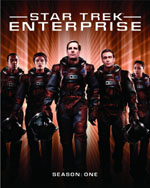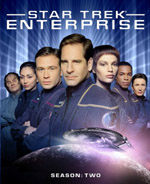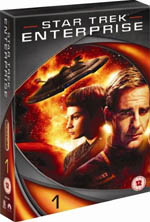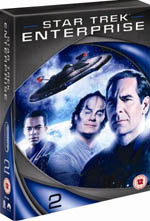26-27: Shockwave
For its season one cliffhanger and following season two premiere, "Enterprise" chose
to go for a double-length chapter in its ongoing Temporal Cold War plot. Though there is
a lot of action and movement in this one, it really doesn't advance this plot at all or
give us any new information. "Shockwave" by and large represents a double helping
of noticeable production value while treading water the whole time.
Part One opens with the story's most literal "shockwave" - an explosion underneath a shuttlepod
that sends it more or less safely hurling off into space, while a colony of 3600 people on the planet
below (buildings included) are fatally roasted. At first I was worried that this would be someone's
idea of a magic wave of time coming to change everything, but thankfully it was instead a real and
solid event confined to this time-continuum, an event whose consequences will have continuing impact.
The investigation and soul-searching that ensues is interesting, but not complex enough to fill
even one episode, let alone two. The story doesn't seem able to project a sense of anticipation
about where it's heading any further than one or two scenes ahead at any point, and such scenes
one can predict don't really feel like they will be great ones.
Enterprise ends up getting involved in a fairly satisfying evidence-gathering raid
in part one, but it seems like many opportunities to put a true dent in the Suliban plot
and reveal new information are being wasted.
Ultimately, this tale spends a lot of screen time gratuitously having Archer dragged
all through time for absolutely no good reason at all. Each time we think, "Hey, this might
be an interesting twist..." it actually turns out to be some of the most boring and cliché
time travel material in the entire history of Star Trek. In the future, we the audience are
reminded how much more we and Daniels know about the future of this universe than our
main protagonist Archer, and we once more witness how little he will be able to sink his
teeth into the meat of what's going on and investigate some new answers for us.
Of course, Berman and Braga's dealing with the time travel elements are pretty ludicrous
here. Archer is actually able to point out most of the discrepancies on screen, which indicates
that maybe some uncredited members of the writing/producing staff pointed out some of the faults.
Daniels usually counters with some really lame retorts that attempt to put down Archer's
intelligence and ability to understand time, without being able to offer any actual theories.
It all sounds as if Berman and Braga became defensive about their story in the writers' room,
and tried to use these lines to patch over the holes they were suddenly made aware of.
It seems they wanted to make Daniels' 31st century present day "change" all of a sudden
as a result of what happened in the past, without changing Daniels himself, and didn't realize
that there needed to be a reason for him to slide from one alternate line of history to another.
Daniels eventually has to admit to Archer that something is wrong about that bit. But this part
of the story is never resolved, just forgotten as we move on to other things.
|
Part two appears to have more life and energy to it, as though the design team and effects crew
had a fresh budget to work from, and everyone's energy levels were up a notch. But the story turns
out to be stuck in a bit of a rut at this point, recycling the old "bad guys take over the Enterprise"
plot that had really been worn out on The Original Series with Kirk, Spock, and McCoy.
|
 |
 |
 |
The only bits of part two that seem really worthwhile involve Admiral Forrest and
Vulcan Ambassador Sevol. As this gang are only able to communicate with Enterprise via
the viewscreen, it's a bit weird that a Vulcan ship docks with Enterprise during the conclusion
while we see none of the occupants of that ship making an appearance. The developments here,
and T'Pol's involvement with them, are the most worthy parts of the entire story in the end.
But what did this whole adventure really give us? The only thing that seemed to be at stake
here at any point was the integrity of ye olde "reset button", allowing Enterprise to continue
in early season two doing exactly what it had been all set to do at the end of season one.
Nothing's actually changed, and we haven't learned anything new about the Suliban
or the Temporal Cold War.
Only part one gave us scenes with the dark mystery figure from the future, whose identity
had still not been revealed.
Even though I had missed half of the season during the initial broadcast run, "Shockwave"
pretty much told me that I hadn't missed out on any episodes that truly advanced this
plot either.
As I had predicted from the pilot, a long-term time travel plot had now resulted in
a very silly "big" mythological story that went nowhere. How many more of these did
we have to look forward to?
This entire multi-story long-term plot had by now dragged on
much too long to be interesting,
and any hope that this story might wrap it up could only have led to sore disappointment.
Berman and Braga were defying all story logic and marketing sense to
perpetuate Gilligan's Island Syndrome on Star Trek once more.
One can only live on hype and production value for so long. In terms of actual story,
this season one finale and season two opener had turned out to be of less interest than
most of the first season's regular episodes.
Read the next In-depth Analysis Review:
"Carbon Creek"
|
|










 slimline
slimline



